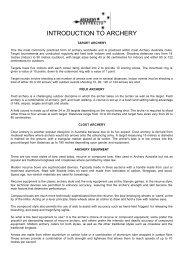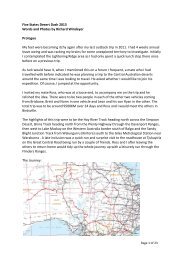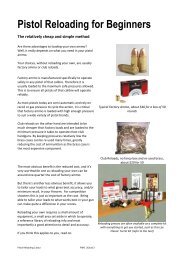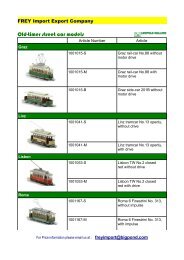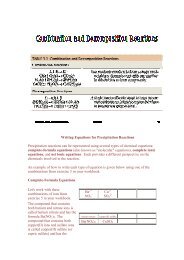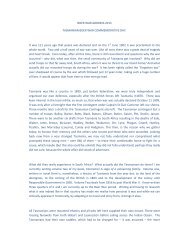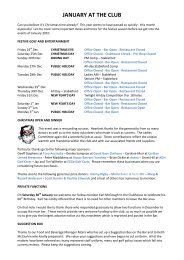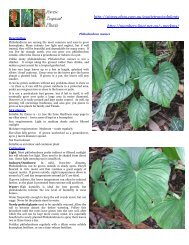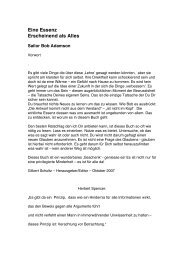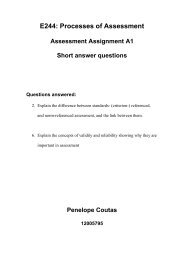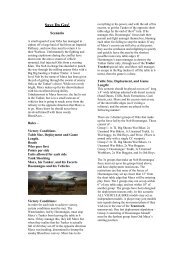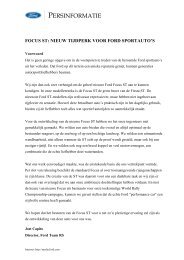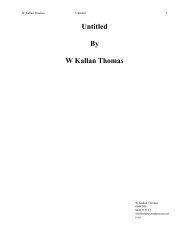Morsecodians Messenger Vol 3 Issue 12 1/6/2009 - iiNet
Morsecodians Messenger Vol 3 Issue 12 1/6/2009 - iiNet
Morsecodians Messenger Vol 3 Issue 12 1/6/2009 - iiNet
Create successful ePaper yourself
Turn your PDF publications into a flip-book with our unique Google optimized e-Paper software.
John Morgan 1911 – <strong>2009</strong><br />
President Terry Keays (08) 9279 4696<br />
Vice-President John Meadowcroft (08) 9386 6636<br />
Secretary Richie Bright (08) 9276 6936<br />
Asst. Secretary Allan Greenslade (08) 9390 5410<br />
Meetings are held on the 3rd Monday in February, June and<br />
October each year in the Italian Club North Perth.<br />
Postal Address: The Secretary <strong>Morsecodians</strong> Fraternity of Western<br />
Australia (Inc.) 475 Crawford Rd Dianella WA 6059<br />
Newsletter Editor: Larry Rice (08) 9255 2280<br />
Club Email jarbright tadaust.org.au<br />
Newsletter email oseagram iinet.net.au<br />
Page 6<br />
Jack Morgan was born in Moora on the 13 th September 1911 . He was one of eight children, whose Welsh parents ran a small<br />
dairy. At the age of six he helped an older brother to deliver milk in Moora until the school bell chimed indicating it was time to<br />
attend school.<br />
On his 14 th birthday Jack started work at the Moora Post Office and with the help of Monty Taylor soon became proficient in<br />
the art of Morse Telegraphy. Appointments were hard to obtain in those days and Jack did relief work for several years at<br />
various town in WA before being accepted as a Telegraphist in Training in 1935. He then moved to Shenton Park from where<br />
he would often cycle to work<br />
Jack spent all his working life of 45 years in Telegraphs apart from a few years when he was an Instructor in the Postal<br />
Training School. Known affectionately as ‗Black Jack‘ he was very methodical and meticulous in his ways and many of our<br />
members can be thankful to him for his dedicated instruction on Traffic and Technical Telegraphy. He was also a first class<br />
hand on the Morse key, something he never lost even when well into his eighties.<br />
Jack rose through the ranks to Supervisor Grade 3 (later designated Traffic Officer) and under the Assistant Superintendant of<br />
Telegraphs was responsible for the staffing and operation of the Chief Telegraph Office. He retired in 1971. In 1972 Jack was<br />
invested with the Imperial Service Medal for service to the Commonwealth.<br />
As a young man Jack was a good all round athlete and played football in Moora and later with the Postal Institute team in<br />
Perth. Both Jack and his second wife Gwen were keen tennis players and golfers and played at the Onslow Park Tennis Club in<br />
Shenton Park and Gosnells Golf Club. Later, they moved to Waikiki and joined the Rockingham Golf and Tennis Clubs. After<br />
Gwen passed away, Jack moved to Tanby Hall Aged Care Facility where his love of music came to the fore , especially hymns<br />
and Welsh songs, but he also had quite a collection of all types of music. After 4 years at Tanby, Jack passed peacefully<br />
away early this year at the age of 97. He will be sadly missed by all who knew him. GB Jack.<br />
Let us not forget who gave us telegraphy, the Telegraph Pioneers.<br />
McGowan, Samuel Walker (1829 - 1887)<br />
Born in Ireland, emigrated to Canada with his parents, gained practical experience with several telegraph<br />
companies in North America. Sailed to Australia, arriving in Melbourne in 1853 intending to form a private<br />
company to provide telegraphic linkage between Melbourne, Sydney and Adelaide as well as the goldfields<br />
which fell through. In September 1853 tenders were called for the construction of an experimental line<br />
between Melbourne and Williamstown and McGowan's was accepted. On 1 March 1854 he was appointed<br />
general superintendent of the Electric Telegraph Department of Victoria and two days later the first telegraph<br />
service south of the equator was opened. By December the experimental line had been extended to Geelong.<br />
In 1857 all main centres were connected and lines radiated from Melbourne westwards to Portland and<br />
northwards to the Murray River, and by the end of October telegraph communication between those three<br />
capital cities flowed freely.<br />
From Australian Dictionary of Biography.<br />
Website: http://members.iinet.net.au/~oseagram/mfwahome.html<br />
Harry Winchester transmits the last morse code message<br />
from Sydney General Post Office October 1962.



